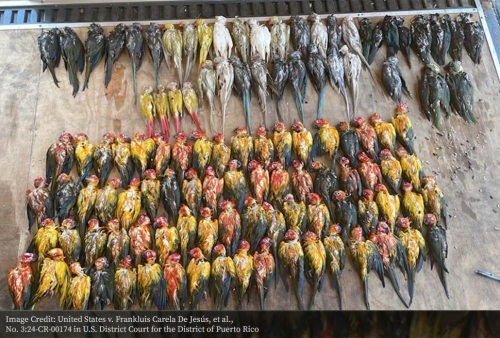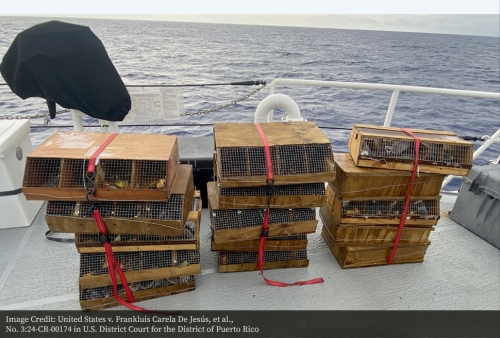
Four Dominican nationals were sentenced last week for their involvement in a wildlife trafficking operation that sought to smuggle over 100 tropical birds from Puerto Rico to the Dominican Republic. The final two defendants, Frankluis Carela De Jesús and Domingo Heureau Altagracia, received their sentences after pleading guilty to Lacey Act violations for trafficking and smuggling wildlife.
De Jesús, 37, was sentenced to 12 months and one day in prison, while Altagracia, 38, received an 8-month sentence. Two other defendants, Waner Balbuena and Juan Graviel Ramírez Cedano, had previously been sentenced to 12 months and one day each.

The defendants were caught on May 3, 2024, attempting to smuggle the birds in a flagless vessel off the coast of Puerto Rico. The U.S. Coast Guard (USCG) intercepted the vessel about 30 nautical miles north of Puerto Rico, where the crew was observed throwing items overboard. Upon boarding the vessel, authorities discovered the crew had discarded wood cages containing tropical birds into the water, resulting in the drowning of 113 birds, many of which were internationally protected species.
The birds recovered from the water included species like the white-crowned parrot, golden-capped parakeet, and green-cheeked conure, all of which are protected under international wildlife conservation treaties. Additionally, the defendants had red-crowned parrots, a species considered critically endangered due to its exploitation in the illegal pet trade.
“These defendants were caught in the act of smuggling tropical birds from Puerto Rico and then drowned them to cover up their crime,” said Acting Assistant Attorney General Adam Gustafson of the Justice Department’s Environment and Natural Resources Division (ENRD). “Smuggling, whether it involves wildlife or other goods, is illegal, and we will prosecute those who try to circumvent our laws.”
U.S. Attorney for the District of Puerto Rico, W. Stephen Muldrow, also condemned the actions, stating, “Endangering the welfare of animals for personal gain was not only cruel—it was illegal. Thanks to the hard work of our prosecutors and law enforcement partners, justice has been served.”

The case, which involved a complex interagency effort, also saw praise from the U.S. Fish and Wildlife Service (USFWS) and U.S. Customs and Border Protection (CBP). USFWS Assistant Director Doug Ault highlighted the devastating impact of wildlife trafficking on vulnerable populations and the critical conservation efforts at stake.
“The illegal smuggling of tropical birds not only threatens vulnerable populations but undermines conservation efforts,” said Ault. “This prosecution underscores the serious consequences of wildlife trafficking and the lasting damage it inflicts on natural resources.”
The U.S. Coast Guard, which typically focuses on enforcing fisheries laws, also commended the success of the operation. “This case highlights the importance of our partnerships to secure maritime borders and deter illicit trafficking that fuels criminal enterprises,” said Commander Matthew Romano, Coast Guard Sector San Juan’s chief of response.
Director Roberto Vaquero of CBP San Juan Field Operations also weighed in on the importance of protecting borders from illicit wildlife trafficking. “Wildlife trafficking is not just an environmental crime—it’s a direct threat to public health, economic stability, and global biodiversity,” Vaquero stated.



